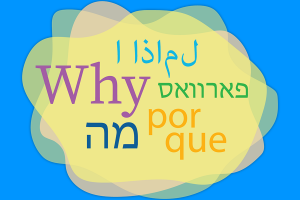Pesach 2021: Freeing ourselves with faith
SOON: Passover begins this Saturday night, March 27.
March 24, 2021
“All who are hungry, let them come and eat!
All who are needy, let them come and conduct the Pesach Seder!
Now we are here; next year we will be in the Land of Israel.
Now we are slaves; next year we will be free men.”
-Passover haggadah, Ha Lachma Anya section
What does it mean when the Haggadah states that “Now we are slaves; next year we will be free men?” Why are we still considered slaves today, if our ancestors experienced the exodus from Mitzrayim, from Egypt?
The answer appears simple: even though we were redeemed from Egypt, we are still in exile because we have not rebuilt the Beit Hamikdash, the Holy Temple in Jerusalem, and moreover, Moshiach, the Messiah, has not come.
So what’s the point in celebrating the exodus when we are still enslaved to a life in galut — exile?
And still enslaved, this year, also by the limitations of the coronavirus pandemic?
The answer lies in the distinction between God’s power to redeem us and our own responsibility to take in and internalize God’s energy. There is no better moment than now to remember the difference between the historical act of God taking us out of Mitzrayim and our own responsibility to take ourselves out of metzarim — narrow straits and limitations, a word that is contained in Egypt’s name.
When B’nei Yisrael came out of Mitzrayim, God imbued their souls with emunah — faith. But that pure faithfulness waned over the generations. Of course, God could have created us without the capacity to doubt and lose our faith. But what He truly values is our ability to struggle with our yetzer harah — evil inclination — and overcome weaknesses, challenges and doubts ourselves.
Pesach is thus about how we ourselves, using our faith in God, can succeed in a personal quest to become free from the slavery of self-doubt and limitations that are self-imposed.
This Pesach we are still enslaved by the limitations of the pandemic, but we have all made efforts to overcome the restraints and struggles of the past year and to grow and thrive. We have maintained our connections to the people who matter most despite the metzarim of Zoom and social distancing. We have maintained our faith that we will one day be free from the masks and restrictions that plague our everyday life.
As the haggadah also tells us: “In every generation and every day, a person is obligated to regard himself as if he had that day come out of Egypt.” (Pesachim 10:5). Thus it is our duty to keep hold of the redemptive energy that we received when God took us out of Mitzrayim. The miraculous story of an enslaved nation defeating the mighty Egyptian empire should imbue us with the spiritual inspiration to improve ourselves and to live our lives in a meaningful way. Moreover, the miracles of Yetziat Mitzrayim are a reminder that God is the Master of the universe, and that the limitations of the pandemic should actually strengthen our faith and our practice in leading meaningful lives.
Although we are still in exile, we celebrate the Exodus from Mitzrayim to remind ourselves of God’s omnipotence, along with the promise we make that, as the Haggadah concludes, “Next year we will be in the Land of Israel. Next year we will be free men.”
Since we can’t promise that the Beit Hamikdash will be rebuilt and Moshiach will arrive — or even, really, when the end of the pandemic will arrive — what then are we really promising?
We are promising to accept God’s gifts of Torah and mitzvot. We are promising to do the work to redeem ourselves. And we are hoping and praying to merit the ultimate redemption – Moshiach, the rebuilding of the Beit Hamikdash, and overcoming not just the pandemic but each of our yetzer harah, and becoming our best selves.
















